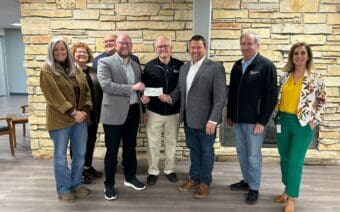
March 23, 2023
NORTHEAST WISCONSIN – For decades, schools across the country have faced a slew of literacy challenges – with districts adopting programs and initiatives in a continued effort to meet the needs of their respective students.
One local school district is doing what it can to make strides in improving its student reading assessment scores – and is taking what it has learned along the way to the State Capitol.
Kyle Thayse, district instructional coach for the Luxemburg-Casco School District, appeared at a joint hearing of the Wisconsin Senate and Assembly Education committees earlier this month to share the district’s reading success story.
The joint informational hearing was one step toward a reading proposal on the “science of reading” approach to teaching literacy, which could receive bipartisan support in the State Legislature.
Thayse said his presentation detailed the district’s journey from a 39% average proficiency on state English Language Assessment (ELA) for grades three through six from 2010-14, to a 62% average proficiency from 2015 to present day.
Locally, Luxemburg-Casco has ranked fourth or better in ELA test scores – as measured by the District Report Cards of the Wisconsin DPI – each of the last three years among the 38 school districts of the Cooperative Educational Service Agency for Northeast Wisconsin (CESA 7).
Thayse said he attributes these improvements to several initiatives the district undertook.
“We were able to have the conversation about curriculum and assessments that previous to (the start of the initiative) identified pockets of goodness throughout the district, but not a real coordinated effort,” he said. “Then we were able to shine a light on what should be done from a systemic point of view.”
Getting started
As part of the initiative, Thayse said a curriculum committee was formed.
From there, he said he began working with Mike Snowberry, director of learning services, to identify where students were at academically before transitioning to the next grade, as well as before taking the Wisconsin Forward Exam – which according to DPI was implemented during the 2015-16 school year and is designed to gauge how well students are doing in relation to the Wisconsin Academic Standards.
The standards, according to DPI, outline what students should know and be able to do to be college and career ready.
The exams are administered online in the spring of each school year and are focused on four categories – English language arts (third through eighth grades), mathematics (third through eighth grade), science (fourth through eighth grade) and social studies (fourth, eighth and tenth grade).
“We were able to have good, collaborative conversations with teachers so we could really talk about what the standards are,” Thayse said.
Implementation
After the curriculum audit was completed, Thayse said, the district chose a three-pronged approach to teach students how to read that includes phonics, phonemic awareness and a regular reading program.
The next challenge, Thayse said, was getting staff up to speed on the approach to teaching the new curriculum.
“Teachers have a lot on their plates, and at that point we were asking them to implement a new reading curriculum and phonics curriculum at the same time,” he said. “We had a phenomenal phonics coach come in to lead us.”
Thayse said teachers were split into teams for professional development, which allowed for a more efficient use of time.
“That allowed us to move faster,” he said. “I can’t emphasize enough the team aspect to all of this.”

Cory Mathieu
Thayse said just as the district was starting to see its efforts come to fruition, Gov. Tony Evers ordered all Wisconsin schools to close March 13, 2020, due to COVID-19.
Luxemburg-Casco made the shift to online learning through the end of the 2019-20 school year but was one of the few districts to open fully in-person the following fall, which Thayse said resulted in an influx of transfer students.
“I think being open for the whole year was very powerful, but we had to find a way to adjust to the number of new students coming in, including a lot of kids from outside the district,” he said.
Thayse said the district utilized Elementary and Secondary School Emergency Relief (ESSER) funds to hire six teachers specifically to work with transfer students or those kids who had regressed from virtually learning.
“They worked with those kids to get them caught back up, and that is why on the literacy side, we saw only about a half a point drop on that first Forward exam after COVID,” he said.
Post-secondary effort
Efforts made to improve literacy rates across the region have also ramped up in recent weeks at the post-secondary level.
The University of Wisconsin-Green Bay (UWGB) recently launched the UWGB Literacy Initiative – a new reading-focused program that will provide hours of volunteer reading time to area first through third graders to boost literacy rates across the region.

Michael Alexander
In an appeal to the university in December 2022, UWGB Chancellor Michael Alexander said after attending the recent Brown County Reading Success Summit, he was concerned by data from 2020-21 that showed a 14% decrease in reading proficiency – with only 27% of Brown County students meeting third grade reading proficiency targets – as well as equity gaps between children of marginalized populations and white students.
“We must act to help solve an issue that will undoubtedly affect UW-Green Bay in the future and also impact the economic capacity and equity of our region for generations to come,” Alexander said.
Alexander then asked all faculty and staff to use flexible hours to volunteer to read to students in first through third grades.
The university also worked with several school districts – including the Howard-Suamico, Pulaski Community and Sheboygan Area School districts – and other community organizations to identify specific ongoing volunteer reading opportunities across the region.
“This is the first of many steps that we as a university need to take to improve the literacy rates in our region,” Alexander said.
In addition to identifying volunteer opportunities, Samantha Meister and Cory Mathieu, UWGB assistant professors in the university’s education program, developed the Reading Mentor Prep course to help volunteers learn best practices for shaping a child’s love for reading.

Samantha Meister
Mathieu said the course is self-paced, which takes about two to three hours to complete, and gives volunteers strategies for engaging and supporting children in reading and helps them feel more confident as they read with children.
“Both of us were very thoughtful in considering the views of the person who doesn’t consider themselves an educator,” Mathieu said. “We asked ourselves, ‘what are the basic strategies that they can use to maximize the use of their time in reading to students or listening to them, and we really focused on volunteers in the community, parents, guardians and caregivers?’”
Meister said reading with children is more than just opening a book.
“This course provides adults with a variety of strategies they can use to help children practice their literacy skills as they read together,” she said.
For more information on the UWGB Literacy Initiative, and to access the free training, visit: uwgb.edu/chancellor/literacy/.
 Making a Difference: This year’s Bart and Cherry Starr award recipient bleeds Green and Gold
Making a Difference: This year’s Bart and Cherry Starr award recipient bleeds Green and Gold For the ‘Love’ of kids, football and giving back
For the ‘Love’ of kids, football and giving back







